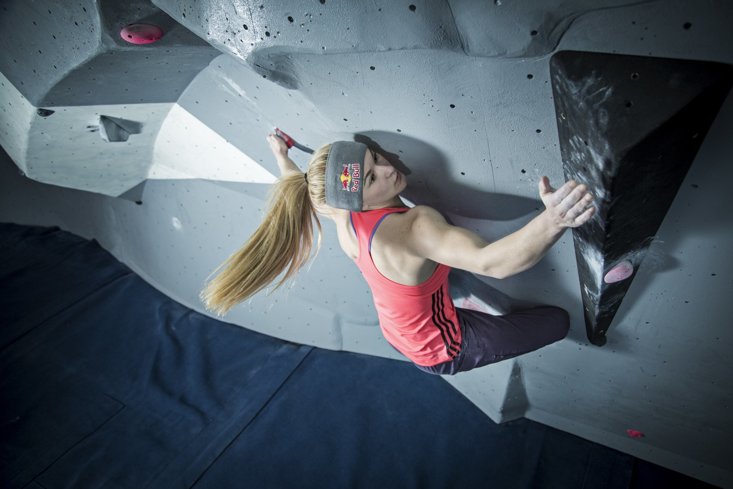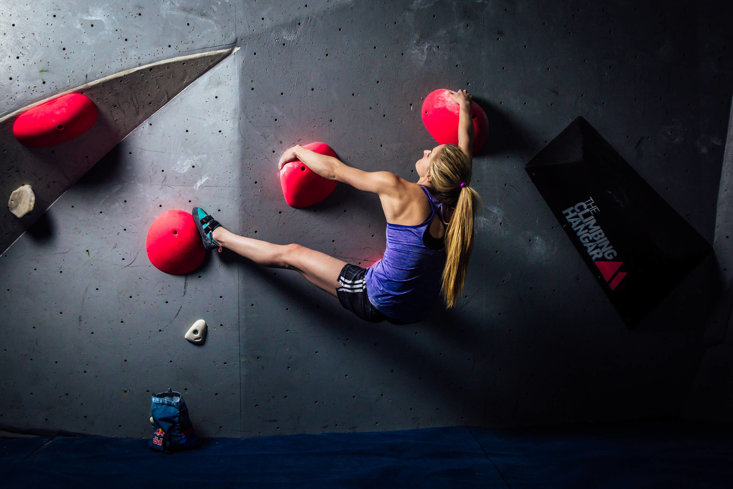Shauna Coxsey can climb quicker than most people can fall. Okay, that may be a tad hyperbolic, but it has been almost impossible to tear the athlete away from a wall since she was four years old.
The 27-year-old from Runcorn is the United Kingdom’s most successful ever climber, a double-World Cup winner, Britain’s best boulderer, and one of only a handful of female climbers to have conquered what is regarded as the third most difficult route to accomplish. On top of that, she was awarded an MBE in the Queen’s 90th Birthday Honours List in 2016.
Bouldering is one of the three Olympic climbing disciplines, not too high off the ground, above mats for protection, without wearing a harness or using ropes. The sport involves navigating difficult routes involving lots of different angles with lots of different styles of movement. The other two disciplines are the more endurance-based lead climbing - using and collecting in a rope as you climb new routes - and speed climbing. The latter utilises a set retained route up a 15-metre wall, 15 degrees overhanging with exactly the same climb every time. The world record is an astonishing 5.48 seconds.
So how did entry into this particular world come about for Shauna?
“My dad and I would always watch the Adventure Channel and I was always obsessed with watching all the different sports,” the Red Bull athlete tells The Sportsman. “I saw a free-climber called Catherine Destivelle, climbing without ropes up rocks in Africa. I just remember looking at the TV, turning to my dad and saying: ‘That’s what I want to do.’ We found our local climbing centre about a year later and I guess the rest is history.”
Two decades on, Destivelle - who was the first female to accomplish many notorious ascents - came and spoke at an event Coxsey organises, The Women’s Climbing Symposium. As formative a figure as the French climber was, Coxsey has now dominated the sport herself. Shauna, one of seven siblings, was allowed to pursue her interest thanks to the time and investment of her father.
“I started in the kids’ group then I asked my dad if he could take me climbing every weekend,” she adds. “It was rope climbing that I initially started doing before bouldering. I guess I didn’t want to wait for my turn in the queue and was just a bit impatient.
“We started going every Sunday. That became every Thursday and Sunday. Then that became every Tuesday, Thursday and Sunday. Eventually climbing just took over.”

Coxsey considers a number of qualities as being imperative to her success: “I think being really stubborn is the key. Getting good at a sport takes a lot of time and a lot of patience. It can be boring at times but you really need persistence.
“There’s a lot of things you need but if you have belief, desire and determination then you can get there. Being resilient and coming back from injury is part and parcel of being an elite athlete. But you’ll be hard-pressed to find a successful athlete who isn’t stubborn.”
Bouldering has had a positive impact on Shauna away from the wall, developing into being lucky enough to have a healthy social circle. Fundamentally, however, success has been hinged on the backing of her family.
“They’ve always been very familiar with what I’m doing and they’ve always been incredibly supportive," she adds. "I think one year there were 21 of my family members who turned up to support me, all wearing matching t-shirts with my face on them, which was of course supportive and embarrassing at the same time but I am really lucky.
“I know my dad sacrificed a lot. He has always said he didn’t make sacrifices, he made choices to support me, which I massively respect and admire. He’ll still be that extra bit of motivation for a training session, or if things aren’t going quite right he’ll help get me back on track. He’s been a huge part of my climbing career and I’ll be forever grateful.”
Regardless of individual circumstances, Shauna believes that considering climbing as a niche sport, inaccessible for most, is a common misconception.
“If you can walk up the stairs you can get up a climbing wall,” she argues. “It’s very accessible and very inclusive as well. There’s so many climbing centres all over the UK now. You can just call them up and book an induction session.
“As a kid, you’re probably always climbing - up walls, up trees. As an adult you think you have to stop doing that, but there’s really no reason why you have to stop climbing. Especially when you’re starting it’s a lot about your legs and your whole body, it’s not just about your arms."

In 2014 Coxsey became one of the only women in the world to complete an 8B+ route, which is the third-most complex in the sport. But Shauna doesn’t base her success and enjoyment of the sport purely on medals and world titles.
“For me it’s always about what’s next,” she adds. “I don’t see myself as someone having won world titles and World Cups, it’s always about the next goal. Not so much the big achievements, but rather the little goals along the way. I’m incredibly proud of what I have achieved and grateful to the people who have made that all possible. It’s one person who gets the medal but it’s a massive team effort.
“In the years that I’ve been climbing, the sport has massively grown, developed and changed. Personally it’s been really fascinating to watch that happen and also to be part of that.”
In 2021, after a 12-month delay enforced by Covid-19, Shauna will be heading to the Olympics in Tokyo, with climbing being included for the first time in the event’s history.
“It’s still kind of crazy and surreal for me that climbing is actually in the Olympics and just to think that I’ve qualified for the games just blows my mind, still, even though I’m training towards it already,” she says with delight.
“It is such an exciting time for our sport and to be part of it.“
The first selection event for Shauna to eventually make the Games came in August 2019. Competitors from all over the world competed in three separate world championships and then a subsequent combined world championship. On the first day of qualification Shauna finished in first place, eventually walking away with the bronze medal.
“I still feel that I’ve got a lot of improvement to make," she says. "I still have huge gains to make across all three disciplines, which massively excites me to be honest, knowing there’s so much more I can give to the sport and I can get so much stronger, so much fitter, so much faster and that’s incredibly motivating.
“The thing I’m most proud of is that I can still sit here and say that I love my sport. It’s really easy to get lost in the world of professional elite sport.
“The fact that I still love going climbing, it still puts a huge smile on my face and is still a massive part of my life. That’s the thing I’m most proud of.”
This article first appeared in The Sportsman on 10/11/19